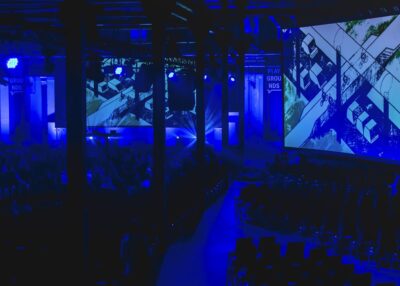Building a Website for Conventions: 10 Topics and Pages To Include on Your Website
If you are planning to host a convention and want to maximize your reach the first step is building yourself a user-friendly, professional website.
Website design for conventions is not uncommon and can be extremely helpful in order to reach the audience you are attempting to appeal to, regardless of industry. Use this outline when you start building your website as a guideline for the different pages and resources you should include.

1. About/About Us Page
When creating a website for a convention in any industry or market, you will need an "About" page. This page will cover the following:
- Mission Statement/Purpose: Why are you hosting your convention(s)? Is there a bigger purpose for your convention?
- Who is the Convention For?: What audience are you trying to reach? Do you have specific demographics in mind for your conventions? Inform your readers of the audience that your conventions are designed to attract the most genuine attendees.
- History: Does your organization have a history behind it? If so, this is the best place to share that information. Sharing the foundational history of a convention company, host, or management service can also lend credibility to your name in the industry.
2. Policies (COVID, Dress Codes, etc.)
Create a Policies page on your convention website to cover numerous policies that may or may not be relevant to you. Policies may be relevant to you based on the type of event you are hosting, regional/local requirements, as well as personal preferences.
Some policies to consider including more details on your convention website include:
- COVID: Although the official COVID-19 pandemic has been put in the past by many, some still prefer to include COVID-based policies at their conventions and other hosted events. Include any COVID-centric policies such as masking, social distancing, and even no-touch entry solutions depending on how you intend to set up your convention event.
- Dress Codes: Include any and all information regarding potential dress codes that attendees must abide by when attending your event. Dress codes might include casual attire or even business casual outfits, depending on the type of convention you are hosting and the audience you expect to attend.
- Live-Streaming/Videos: Allowing attendees to live-stream your convention is up to you. However, if this is against the convention's TOS, or Terms of Service, it is best to include this on your website ahead of time. Consider whether or not you will allow attendees to videotape entire segments that are being hosted by speakers and talent or if they should keep cameras away during these times.
- What’s allowed/not allowed: You should include this for them to agree to during registration and checkout alongside your terms and conditions. However, it can be a good idea to highlight this throughout your website or on it’s only page so important details are not overlooked or misunderstood.
3. Registration/Ticket Sales
Creating an online registration page for selling tickets is highly advisable when building a website for conventions (regardless of the type of conventions you intend to host). Using an online registration platform to sell tickets to an event can help streamline the ticket-selling process while providing valuable insights into the number of tickets that are being sold on a daily basis.
|
Start selling tickets within minutes! Create a promoter account, upload your |
Make sure this process is extremely user-friendly and try to keep the process of purchasing tickets as short and quickly as possible.
4. Talent, Highlights, Speaker Profiles
Create a page for the talents and speakers you intend to host during your convention(s). This can include speaker profiles, topic highlights, and even complete itineraries of when each individual speaker will be available or on stage.
This will help give guests a better look into who will be attending, what they can expect of the event and better insight into your guests or speakers.
5. Region/City Information (What to Do, Sights to See, etc.)
If you are hosting your convention in a particular city or region, include information about the city and what there is to do (especially for out-of-town visitors and tourists). You can include information such as
- Sights to see, monuments to visit, etc.
- Popular restaurants
- Transportation tips (getting-around)
- Near my hotels or accommodations
6. Your Daily Blog (or Spotlight Articles)
Use your official convention website to launch a blog of your own. Create spotlight articles to draw attention to your conventions, past media you have captured, and even the hosts you intend to have to speak at your upcoming events.
Here are some ways you can use blogs to market your event or organization:
- Create quality content that draws in readers and traffic to your website
- Embed call-to-actions and links throughout the content
- Create spotlight articles or highlights that people can share to generate buzz
- Make your website more searchable online by putting out more content to boost your SEO
7. Event Schedule(s)
Create an Event Schedule page on your convention website to include a digital itinerary of your event. This is especially helpful if you are hosting a multi-day event. Include information regarding speakers, talent, and even various mini-events you intend to host throughout the convention to help draw attention and ultimately generate ticket sales.
Also include if there are any breaks in between, lunches or snack times.
8. Images, Graphics, and Video Media of the Event
It’s important to include images, graphics and media on your website to legitimize the event itself. If this is your first time hosting such event, work with a professional photographer to create sneak peek images or stock images to include on the website.
Consumers like to see ‘proof’ before they commit to something; whether thats products, events, experiences, etc.
9. Social Media Links
While fleshing out the layout of your website, be sure to include space for your social media links. Implementing special media links and buttons throughout the headers and/or footers of your website will help you to spread the word about your site and incentivize ticket sales for your conventions.
Additionally, the more prevalent your social media links are, the easier it becomes to boost your website's SEO, or search engine optimization, within top search engines such as Google, Yahoo!, and Bing.
10. Customer Support Information
Create a page on your convention website that includes customer support information for attendees and for those who may be interested in attending your event. Your customer support page should include information about the event (including a full itinerary with dates and times), as well as the ability to get in touch with someone managing the event via live chat, email, or, if possible, even phone.
|
Request your venue seating map We build an unlimited amount of maps for |
Website design for conventions does not have to feel complicated and/or overwhelming, especially if you have an idea of where to begin.
Once you are comfortable with the web design platform you are working with and the ticketing registration solution you have chosen, you can move forward with building your website for any convention you intend to host and/or oversee.







